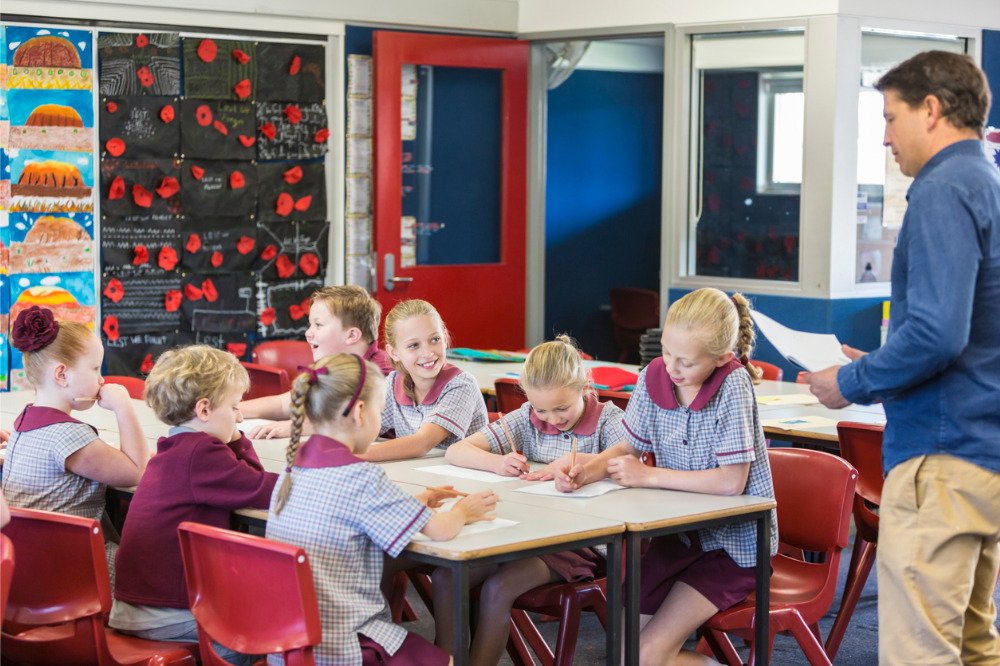
Research shows one in three Australian teachers are losing valuable teaching time due to disruptive behaviour, significantly impacting students’ ability to learn.
A recent Senate inquiry into classroom disruption in Australian schools called for fundamental changes to how teachers approach classroom management.
The final report, titled ‘The issue of increasing disruption in Australian school classrooms’, revealed school staff are dealing with verbal abuse and physical aggression from students on a frequent basis, and that this trend is most pronounced in schools with high levels of economic and educational disadvantage.
In a bid to combat this crisis, the Federal Government announced a range of free, evidence-based resources to help Australian teachers manage their classrooms.
The ‘Engaged Classrooms’ resources, developed by the Australian Education Research Organisation (AERO) in consultation with teachers and classroom management expert Dr Tim McDonald, include easily accessible evidence explainers and adaptable best practice guides. Future resources will include video demonstrations, mentoring guides and support for school leaders.
“These resources are based on the most effective evidence-based classroom management practices for maximising students’ on-task learning time and minimising disengagement and disruptive behaviour,” AERO CEO, Dr Jenny Donovan told The Educator.
“These practices include engaging students through high-quality instruction, fostering a positive classroom culture, supporting teachers via a whole-school approach, maintaining high expectations, and nurturing teacher-student relationships for a safe learning environment.”
Supporting individual and whole-school approaches
Dr Donovan said the new resources will also deliver important benefits higher up the executive chain in schools by positively impacting the overall approach of school principals towards managing student behaviour.
“While resources specifically for school leaders will be released next year, this first suite of foundational classroom management practices enables school principals to provide teachers with the guidance they need to refine and refresh specific elements of their classroom management practice,” she said.
“The resources can be used individually or to support mentoring and other collaborative and whole-school approaches to improving classroom management. Whole-school approaches ensure expectations are consistent across the school, providing a safe, predictable and productive environment for all students.”
Dr Donovan said that by sharing these resources and investing in professional development, school principals can support teachers in refining their classroom management practices, helping prevent and respond to the low-level disengaged and disruptive behaviours that are frequently occurring in classrooms.
“This enables teachers, support staff and school leaders to spend more time on teaching, leading and supporting students with more complex needs. Most importantly, more time for teaching and support means more time for students to learn.”
Meeting one of teachers’ biggest PD needs
On 7 July this year, Professor Mark Scott – who led the government’s Teacher Education Expert Panel – released a report titled: ‘Strong Beginnings: Report of the Teacher Education Expert Panel’, which set out 14 recommendations to revamp Initial Teacher Education in Australia’s universities.
Dr Donovan said the report highlights that many beginning teachers want greater support with classroom management and that AERO's resources provide this by offering free, practical guidance on developing the foundational classroom management practices teachers need.
“These foundational resources support early career teachers to develop their classroom management practices in any primary and secondary school location and context,” she said.
“The evidence-based practices and skills are clearly explained with step-by-step guidance to help teachers rehearse and practise individually and with others. We’ve also provided guidance on planning for behaviour and building positive connections with all students.”
Dr Donovan said AERO envisages these resources being incorporated into whole-school development activities for early career teachers, such as in mentoring and feedback conversations, as well as modelling teaching and observations of practice. She added that further guidance on mentoring to strengthen classroom management practices will be published by AERO in 2024.
Addressing low-level disengagement and disruptive behaviours
AERO’s new resources also focus on addressing low-level disengagement and disruptive behaviours by supporting teachers to refine their proactive and preventative classroom management practices.
“These practices support students to develop and demonstrate the expected behaviours and prevent or reduce the occurrence of low-level disengaged and disruptive behaviours,” she said.
“While proactive classroom management is a vital preventative strategy, at times, for a range of reasons, students will demonstrate disengaged and disruptive behaviours.”
Dr Donovan said AERO’s new resources support teachers to respond to these behaviours, providing guidance on non-verbal and verbal corrections, considering the reasons for students behaving in disengaged or disruptive ways, and responding in supportive ways to address the disengagement or disruption and re-engage students in their learning.
“Any teacher will tell you that teaching is complex, requiring them to draw on a significant repertoire of skills in their planning and throughout every lesson, every day,” she said.
“These resources acknowledge this complexity and set out step-by-step guidance to help teachers refine classroom management practices that are proven to actively engage students in learning. Evidence shows these classroom management practices create more time for teaching and learning.”
Dr Donovan said that by refining their existing practices using our resources, teachers will be able to develop more efficient and effective daily routines; establish high expectations and rules; respond effectively to disengaged and disruptive behaviours; and strengthen relationships with students.
“The resources support teachers to create safe and supportive classrooms where students know and can meet expectations and fully engage in learning.”


